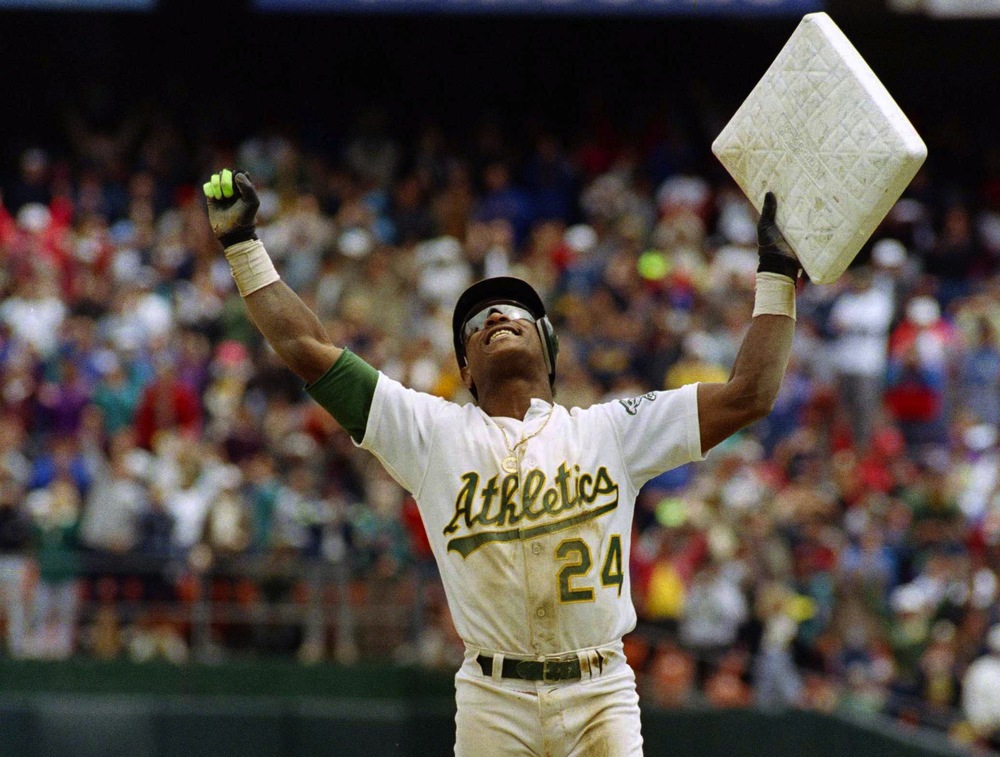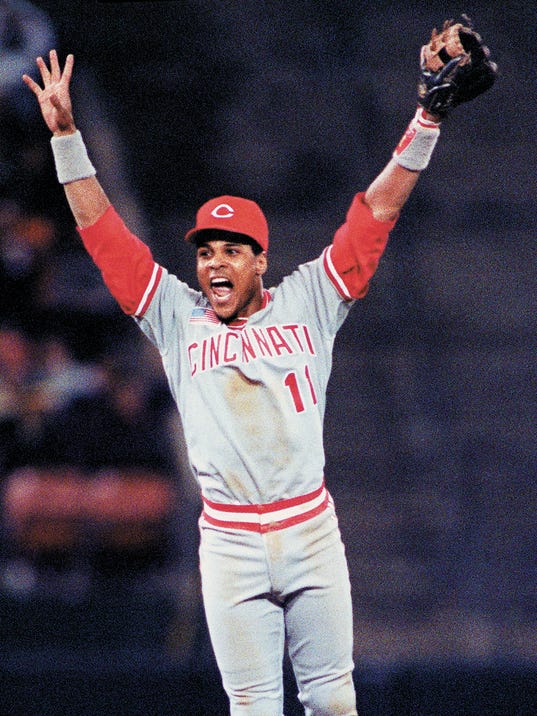I feel compelled to remind you that I became a baseball fan in 1986, and for the purposes of putting these rankings together, anything before then was ignored. I mention this because from 1980 through the 1985, Rickey Henderson was the best baseball player on the planet, and that stretch isn't being counted here, yet he still made the list. I've basically taken away more than 1000 of his 3055 career hits, more than 700 of his MLB record 2295 runs scored, and precisely 573 of his MLB record 1406 stolen bases, yet he still cracks the top 20. If I'd included his full career, Henderson would have ranked 6th on this list, and if I ranked the top players in history, Henderson would be among the top 25. He was tremendous.
Friday, April 22, 2016
Friday, April 15, 2016
Best players of the last 30 years, #22: Roy Halladay
Near the end of this countdown will be four starting pitchers who not only comprise the pitching Mount Rushmore of my life as a baseball fan, they all belong somewhere near the top ten pitchers in baseball history. Probably no era had four pitchers of such excellence at the same time. So much greatness leaves a wake in its path though, and the consequence of that wake is that other starting pitchers from the last three decades have rarely gotten their due. Greg Maddux, Randy Johnson, and Pedro Martinez (three of the four pitchers I alluded to) cruised into Cooperstown in their first year of eligibility; Roger Clemens has been waylaid by PED connections. Only two other pitchers whose career came mostly during my thirty years as a fan have been voted into the Hall of Fame though: Tom Glavine and John Smoltz. They both deserve the honor, but as this list will show, I think even better pitchers have landed on the ballot in recent years and been denied. The next pitcher with much of a chance of getting through the doors will be Roy Halladay.
Friday, April 8, 2016
Best players of the last 30 years, #23: Ivan Rodriguez
Some positions in baseball have what feel like a prototype. The prototype first baseman isn't a tremendous defender and may not hit for a great average, but he's got a ton of power at the plate, and posts big home run totals. The prototype shortstop is the opposite, a player without much power, but who can slap some singles, steal a few bases, and make tremendous defensive plays. The prototypical catcher has some pop in his bat (though not enough to lead the league in home runs or anything like that), but doesn't have great speed. He isn't know for his offense though. He's known for his toughness, his leadership, his ability to call a good game, and for exploding out of his crouch to nail runners at every base with strong, accurate throws to any base. In my lifetime, the best prototypical catcher has been Ivan Rodriguez.
Sunday, April 3, 2016
2016 MLB predictions
I don't remember what happens if you make these sort of predictions and turn out to be right, because it's been a while since I had the correct World Series winner. All the same, each time Opening Day rolls around, I find myself compelled to make them again. In the four years I've been writing about baseball online, I haven't gotten a single World Series participant right. I'm 0 for 8 on those, and only 11 for 24 on division winners. I've been correct on only one of my eight Cy Young guesses, and on none of my eight MVP selections. Despite all that, when Opening Day rolls around, like the swallows returning to San Juan Capistrano, I must make predictions.
Friday, April 1, 2016
Best players of the last 30 years, #24: Barry Larkin
Barry Larkin was a better baseball player than Derek Jeter.
Jeter will rank ahead of Larkin on this list, because being able to stay on the field matters, and Jeter was a lot better at that, but in terms of doing things well when on the field, Larkin was superior, and I don't think it's especially close. As hitters they're close, with Jeter batting .310/.377/.440 for his career, and Larkin batting .295/.371/.444. Adjusting for their respective ballparks and slightly different eras, Jeter had an OPS+ of 115 and a wRC+ of 119, while Larkin had an OPS+ of 116 and a wRC+ of 118. Both were good base runners, but Larkin has the edge, stealing more bases and with a higher success rate, plus doing things like taking the extra base a bit better. Once you look at defense, Larkin pulls well ahead. He was a good defender, while Jeter was a poor one. Larkin's sample size is far smaller, but he also has better postseason numbers than Jeter. It seems off to call someone who won an MVP and was voted into the Hall of Fame underrated, but I'm going to. Barry Larkin doesn't get nearly the attention he ought to.
Jeter will rank ahead of Larkin on this list, because being able to stay on the field matters, and Jeter was a lot better at that, but in terms of doing things well when on the field, Larkin was superior, and I don't think it's especially close. As hitters they're close, with Jeter batting .310/.377/.440 for his career, and Larkin batting .295/.371/.444. Adjusting for their respective ballparks and slightly different eras, Jeter had an OPS+ of 115 and a wRC+ of 119, while Larkin had an OPS+ of 116 and a wRC+ of 118. Both were good base runners, but Larkin has the edge, stealing more bases and with a higher success rate, plus doing things like taking the extra base a bit better. Once you look at defense, Larkin pulls well ahead. He was a good defender, while Jeter was a poor one. Larkin's sample size is far smaller, but he also has better postseason numbers than Jeter. It seems off to call someone who won an MVP and was voted into the Hall of Fame underrated, but I'm going to. Barry Larkin doesn't get nearly the attention he ought to.
Subscribe to:
Posts (Atom)




